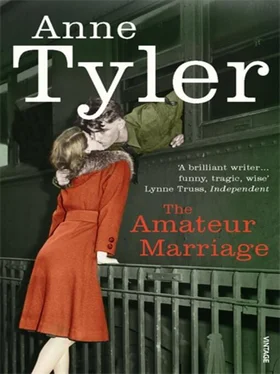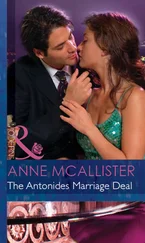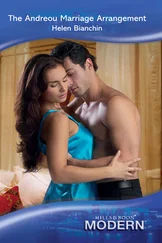“Well, if it does, you need a plumber.”
“Are you saying that it might?” she asked. She straightened up from the counter she’d been leaning against.
“I’m not saying anything, Mom. The pilot was out; I relit it; everything should be fine. You’re the one who’s talking about its happening again.”
“It’s just that if there wasn’t any reason the first time, you see, then there’s nothing to prevent it a second time. If you follow me.”
He sighed. He said, “Why go borrowing trouble, Mom?”
“Well, you’re right. You’re perfectly right! I’m just a worrywart, is all. This house is solely my responsibility. You can’t blame me for being anxious.”
“We’ve said for years you ought to move to an apartment.”
“Oh, George, I raised you children here! It’s my home! I would die if I had to live in some little dinky apartment!”
“Dad did it, for a while,” George said.
“Well, that was your dad’s own choice,” she said huffily. “Besides, he’s a man. Men don’t have the same feeling for houses.”
George was making sure he had his billfold, the way he always did when he was getting ready to go. She could read him like a book. She said, “Would you like a cup of coffee?”
“No, thanks.”
“I can fix it in a jiffy. Or a soft drink? Juice? A beer?”
“The kids will be expecting me,” he said. He chuckled. “That puppy’s a handful.”
“What about now, where your dad’s living now?” she asked in a rush. “Anna’s house. Is it homey?”
“Hmm?”
“Does it feel like, you know, a family house, warm and comfy and lived in?”
“It feels fine,” he said, turning his gaze toward the kitchen window.
“Because I’ve always thought — correct me if I’m wrong — that Anna’s not that domestic. I can’t picture how she would decorate a home. Are there knickknacks and photos and afghans? Or is it more, how would you put it, sterile. Does she go for any particular period of furniture?”
“Oh, Mom, I don’t know,” George said. He was moving toward the dining room now, heading for the foyer. “I don’t know one furniture period from another,” he said. “It’s just a house, is all.”
“But you must have some impression of it,” she said as she followed close on his heels. “You must get some sort of feeling when you enter it — alienated or out of place or dislocated or… what? You can’t have absolutely no opinion!”
He turned at the front door and stooped to brush her cheek with his lips. “Along about, say, five-fifteen,” he said, “check and see if you’ve got hot water.”
He opened the door and walked out.
Sometimes she could just stomp on George.
She did have hot water, finally. She took a long, soaking shower and then she blow-dried her hair and put on a pale-blue dress and blue pumps. (She wasn’t sure where Dun was taking her to eat. She figured a dress would be safest.) Last, she applied her new cosmetics: ivory foundation, a touch of pink blush, rose lipstick, and pale-blue eye shadow almost exactly the color of her dress. The woman who gazed out of her mirror was pink-and-gold, her hair a blond mobcap around her face. Pauline didn’t hope anymore to look beautiful. She was trying instead for acceptable, unobjectionable, likable. She remembered how when she was a girl, the sight of an older woman who’d gone to the effort of lipstick and finger waves had filled her with grateful relief. There was no necessity, then, for pity.
She was just getting into her blazer when the doorbell rang. It was six o’clock precisely, which she found encouraging. Punctuality signified eagerness. (Or was it only that lack of punctuality signified lack of eagerness?) When she opened the door Dun Osgood was already smiling, as if he had been practicing — a wide, fixed, determined smile, shaky at the corners. He was a tall man with an apologetic stoop to his shoulders and an appealingly craggy face topped by a fan of straight gray hair. “Well, hi there!” he said. “How’re you doing?”
“I’m fine, Dun. How are you?”
“Got an awfully nice evening for this. You sure you’re going to be warm enough?”
“I’m sure.” She took her purse from the cobbler’s bench and stepped out the door and shut it behind her. Dun, she saw, was dressed up to about the same degree she was — a sport coat over an open-collared white shirt and good gray trousers. When they started down the walk he took light hold of her arm just above the elbow, and he opened the car door for her and made certain she’d tucked her hem inside before he closed it.
“Think you’re going to like the place we’re going to,” he said as they pulled away from the curb. “Pincers. Have you been?”
She shook her head.
“I used to eat there every Wednesday night with Mattie. Wednesday night is dessert night. Order one dessert, get another of equal or lesser price for free. Mattie would order the Boston cream pie and I’d have the chocolate nut cake.”
“That sounds lovely,” Pauline said.
“Although tonight is not a Wednesday, of course.”
“That’s all right,” Pauline said. “I’ve never been a huge dessert-eater.”
“You don’t mean to say!” Dun exclaimed, astonished beyond all proportion, in Pauline’s opinion. He came to a halt at a four-way stop sign and embarked on a lengthy after-you dance with the other driver before he started up again. “Well, you and Mattie wouldn’t have much in common, then,” he said. “Mattie had such a sweet tooth! At home she always fixed a dessert even when it was just the two of us for dinner. Pies like you wouldn’t believe, flakiest crusts in the world.”
Pauline summoned up a mental image of Mattie Osgood, who had, in fact, seemed the pie type — soft but not fat, with a sun-speckled, cozy face. “You must miss her very much,” she said.
“Oh, yes. Oh, yes.”
His o ’s were Minnesota o ’s, rounder-sounding than most, quaint and naive and sincere.
“There are times I forget she’s not with me,” he said. “I think, I should tell Mattie such and such! or Wait till Mattie hears this! Then it all comes back to me.”
“Or that feeling you get when you’re walking down the street,” Pauline said, “that the person you’ve lost is walking beside you. This warm, accompanied feeling along one side of your body, and then you recollect, and your whole side goes cold and sort of breezy.”
“I’ve had that!” Dun said. He sent her a quick, darting glance.
They traveled for several minutes in silence, Pauline allowing him his private thoughts. The light was fading now and the countryside was losing its colors. The pink blossoms on the trees were a bleached white, the white houses a pearly gray.
“Tell me, Dun,” she said when she felt a suitable time had elapsed. “How did you come by your name? ‘Dun’ is so unusual.”
“Well, that would be from my mother’s folks,” he said. “Dunniston, they were. But I’ve always been just Dun myself.”
“I think it’s very attractive.”
“Why, I like your name, too,” he said.
She settled deeper into her seat, contentedly. They turned east and merged with a stream of other cars. It felt good to be a part of the Saturday-night celebrations. She loved the rituals of dating — the dressing up, the little flutter of anticipation, the process of leading somebody from small talk to real discussion. Dun Osgood’s awkwardness just made him more of a challenge. And anyhow, she’d never cared for a man who was too smooth.
She said, “I don’t think I’ve asked you, Dun. Do you have children?”
“No, no.” Those o ’s again, sorrowful-sounding now. “We wanted them,” he said, “but you don’t always get what you want in this world.”
Читать дальше












